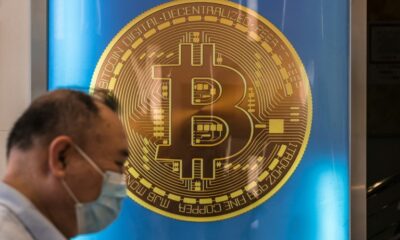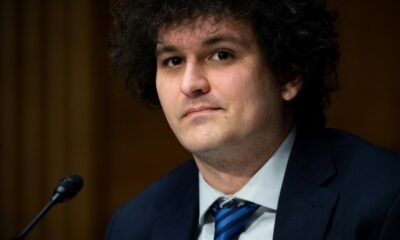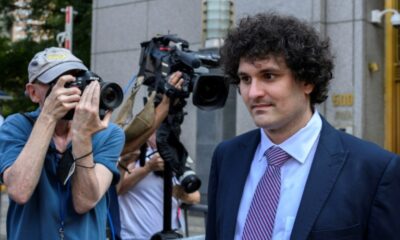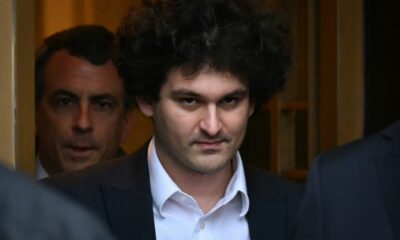Omnipresent on talk shows and conference panels, disgraced cryptocurrency tycoon Sam Bankman-Fried is defying the advice of the legal profession and staying in the public eye despite facing the real threat of prosecution and even jail time.
As the architect and former CEO of a bankrupt enterprise that cannot account for billions of dollars in missing customer funds, Bankman-Fried faces scrutiny from regulators, prosecutors and politicians.
Bankman-Fried’s media blitz will head to Washington on Tuesday where the 30-year-old has agreed to testify before the House Financial Services Committee at a hearing about the crypto exchange’s overnight collapse.
The testimony in the US capital will mark a throwback to the heady period before FTX’s sudden implosion last month, when the mop-haired computer whiz was feted in Washington as a respectable face for cryptocurrency who doled out tens of millions of dollars in political donations.
“By speaking out, Mr. Bankman-Fried is putting himself in greater jeopardy and acting contrary to what competent counsel would advise a client,” said Jacob Frenkel, a former Justice Department prosecutor at Dickinson Wright.
As much as anyone, Bankman-Fried had embodied the apparent arrival of cryptocurrency as a major market in finance and no longer a frowned on get-rich-quick scheme shunned by the establishment.
The Massachusetts Institute of Technology graduate, the son of two Stanford Law School professors, fit the tech wunderkind profile as he posed for magazine spreads and pushed Super Bowl television spots and other splashy marketing campaigns to draw in investors.
But after reaching a valuation of $32 billion, FTX’s implosion was swift following a November 2 report on the cryptocurrency news site CoinDesk on ties between FTX and Alameda, a trading company also controlled by Bankman-Fried.
The report exposed that Alameda’s balance sheet was heavily built on the FTT currency — a token created by FTX and with no independent value.
The price of FTT plunged in early November, roiling both Alameda and FTX, where Alameda had large trading positions.
Reeling from customer withdrawals and short some $8 billion, FTX and some 100 related entities filed for bankruptcy protection on November 11, inviting scrutiny from regulators, prosecutors and furious clients who had believed the hype about cryptocurrency.
Among the revelations, FTX propped up Alameda with billions of dollars in customer funds that are now likely lost forever. Such a use of investor money would constitute fraud if it flouted the terms of agreement between customers and FTX, legal analysts said.
Questions also linger over whether Bankman-Fried engaged in market manipulation, or illegally provided inside information to Alameda.
– ‘Attention can be addictive’ –
Usually people in Bankman-Fried’s shoes follow counsel’s orders to keep a low profile, said defense attorneys interviewed by AFP.
Public comments increase the risk of false or problematic statements, or of torpedoing a potential defense strategy, said Aitan Goelman, a former director of enforcement at the Commodity Futures Trading Commission.
The “limelight and public attention can be addictive,” Goelman said and Bankman-Fried “finds it impossible to sit there and keep his mouth shut, which is the smart thing to do.”
Through a spokesman, Mark Cohen, a defense attorney representing Bankman-Fried, declined to comment when asked by AFP.
Since his downfall, Bankman-Fried has generally adopted a contrite tone in interviews, which he usually carries out by video link from FTX’s Bahamas headquarters.
“I didn’t ever try to commit fraud on anyone,” Bankman-Fried told a New York Times conference on November 30. “Clearly I made a lot of mistakes or things I would be able to give anything to be able to do over again.”
Bankman-Fried acknowledged poor corporate controls and that the interrelationship with Alameda was problematic. He said he was caught off guard by the size of Alameda’s position on FTX.
But some were unpersuaded, including CNBC anchor Rebecca Quick who concluded that “that guy’s a crook and a liar.”
Frenkel, who worked in a senior enforcement role at the Securities and Exchange Commission, predicted the charm offensive would fall flat.
“This is a desperate attempt to persuade the American public and potential jurors that he did not intend to defraud,” said Frenkel.
“It’s a matter of when we will see a criminal indictment, not if,” he said.
– No ‘foregone conclusion’ –
Goelman agreed that Bankman-Fried’s media blitz would not help his cause with prosecutors, but said an indictment is not a “foregone conclusion.”
Goelman noted that the withering assessment of new FTX Chief Executive John Ray of the company’s lack of controls could be consistent with a company that was mismanaged but not necessarily run with fraudulent intent.
But Bankman-Fried faces “potential serious criminal exposure,” Goelman said.
“These investigations take a lot of time,” he said. “The idea that Sam Bankman-Fried should be in leg irons already is inconsistent with our system of justice.”

 Business5 months ago
Business5 months ago
 Business4 months ago
Business4 months ago
 People4 months ago
People4 months ago
 Events3 months ago
Events3 months ago
 Events6 months ago
Events6 months ago
















